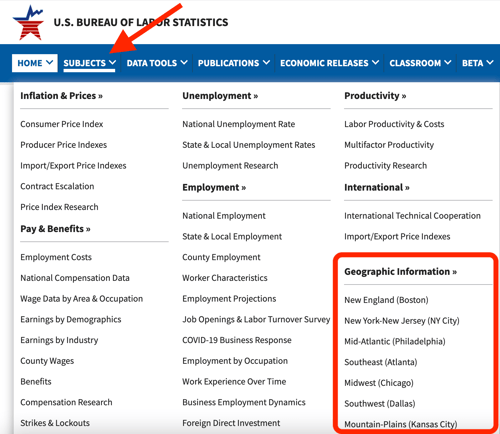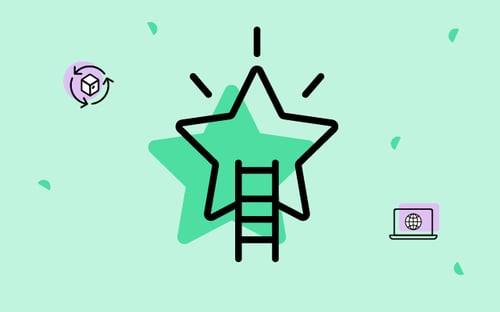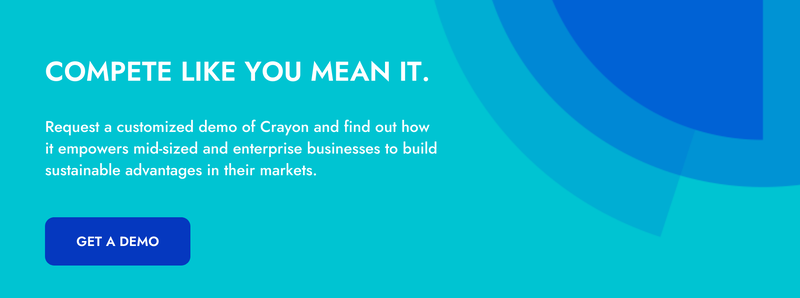There are only so many hours in a day, and there are a lot of tasks that marketing teams tackle on a daily basis. When we think about competitive intelligence (CI), we most commonly think about its benefits for the product marketing and sales teams. But as new companies are popping up, companies are fighting for the top spot of the market leader. Brands are trying to find new ways to resonate with their target market and ultimately win more customers. Now, more than ever, marketing leaders need to prioritize CI in their marketing strategy.
Not only does competitive intelligence help shape business strategies and help evaluate where you need to invest resources, but it can also help solve common business challenges. With the help of competitive intelligence, you’ll be able to craft a strong marketing strategy, improve your competitive win rate, and never be blind-sided by your competition. Marketing leaders might not be responsible for conducting competitive intelligence research themselves, but they will gain immense benefits from having a pulse on every move their biggest competitors make.
Let’s dive into three reasons why marketing leaders should prioritize competitive intelligence.
Spend More Time on What Matters
As a marketing leader, you have a team to manage, budgets to build, strategy to plan, and competitors to keep watch for. With the saved time and resources of an automated CI program, you’ll be able to focus more on executing your strategy. With the support of an excellent marketing team, product marketing team, and a competitive intelligence solution, marketing leaders can focus their time on the work that matters most.
Historically, gathering competitive intelligence data has been manual and time-consuming. Now, competitive intelligence data collection is made easy. It’s often powered by artificial intelligence and machine learning, which means the data presented to you is filtered for what’s highly valuable. Depending on what you’re looking for in a competitive intelligence solution, you’re able to drill down in the data to get as specific as you need to get the results you’re looking for. Regardless of who on the marketing team is responsible for competitive intelligence, automating competitive intelligence will help your team spend less time gathering CI, and more time turning the insights into action.
A robust marketing strategy won’t be complete without leveraging competitive intelligence data. Whether it’s refocusing budget, redesigning a website, or figuring out which projects to focus on, none of it can be done effectively unless you have a look into your competitive landscape. CI will give you insight into your competitors’ strategies — where they’re investing resources and money, what updates they’re making to their messaging, and which companies they’re choosing to partner with. If marketing leaders have a pulse on that, you’ll be able to build out a strategy that rivals that of your competitors.
Better Enable Your Sales Team
As marketers, you want to offer our sales team the right support so that they can win as many deals as possible. You especially want them to win more deals against competitors. So, you want to provide your sales team with the most impactful collateral, materials, and training that will help them sell more effectively.
One way to make your sales enablement materials more effective is by integrating competitive intelligence data. Sure, you’re conducting demo training, providing your team with product one-pagers, and arming them with case studies. But, by integrating competitive intelligence data into your sales enablement materials, you’ll be able to provide your team with all of the information they need to handle competitive objections and win those tough deals. With the help of these materials, like competitive battlecards, your sales reps will never be caught off guard by a competitive objection again.
If you have an automated competitive intelligence solution, and you integrate your CI solution with your competitive battlecards, you’re better able to keep battlecards up-to-date. And, you’re able to provide your sales team with the most relevant data, at all times, rather than crowding them with too much, potentially irrelevant data. You’re also able to effectively track usage of your sales enablement materials and get feedback from your sales team about what works and what doesn’t. This will ultimately allow you to track marketing impact by analyzing usage and engagement on your battlecards. As time goes on, you’ll also be able to measure the impact of competitive sales enablement on win rates and revenue won from competitive deals.
Competitive intelligence will help you build more effective sales enablement materials. CI will open up a new avenue of analysis so that you can better understand what works and what doesn’t when it comes to your team winning more deals.
Keep Everyone Informed on Your Competitive Landscape
With an automated solution, competitive insights can be captured and shared quickly, almost immediately, so marketing leaders can be proactive rather than reactive to a competitor shift. Not only are you able to arm your sales team with up-to-date competitive intel through battlecards, but you’re able to keep your colleagues informed on major competitive shifts.
Once your CI program is automated, you’re able to build deliverables to share key points and compare your current performance to your competitors. This data is highly important for leaders of all departments to stay on top of. Maybe you present high-level competitive updates to the rest of your executive team, or you have your product marketers and/or CI specialists prepare specific competitive intelligence deliverables for each executive. Even better — your automated competitive intelligence solution alerts your team when a major competitive insight is captured. CI data is critical for all departments to have insight into, as it impacts everything from funding to product roadmaps to customer retention, and everything in between.
If you automate your competitive intelligence, you can save time, and focus on building out and executing on a successful marketing strategy. Because, with an automated solution, your team will be able to deliver important insights, rather than having to wade through hundreds of data points. So, your team will have more bandwidth to focus on bigger projects that will benefit your organization.
When your sales team is winning, marketing leaders are winning. Not only will competitive intelligence help marketing provide sales support, but it will also make sure that your team is never blind-sided by competitors. Altogether, an automated competitive intelligence program will make a measurable impact on the business results that matter most. Competitive intelligence goes beyond the immediate needs of your sales and product teams, and is a valuable asset for your whole organization.

Related Blog Posts
Popular Posts
-
 How to Create a Competitive Matrix (Step-by-Step Guide With Examples + Free Templates)
How to Create a Competitive Matrix (Step-by-Step Guide With Examples + Free Templates)
-
 Sales Battlecards 101: How to Help Your Sellers Leave the Competition In the Dust
Sales Battlecards 101: How to Help Your Sellers Leave the Competition In the Dust
-
 The 8 Free Market Research Tools and Resources You Need to Know
The 8 Free Market Research Tools and Resources You Need to Know
-
 6 Competitive Advantage Examples From the Real World
6 Competitive Advantage Examples From the Real World
-
 How to Measure Product Launch Success: 12 KPIs You Should Be Tracking
How to Measure Product Launch Success: 12 KPIs You Should Be Tracking





